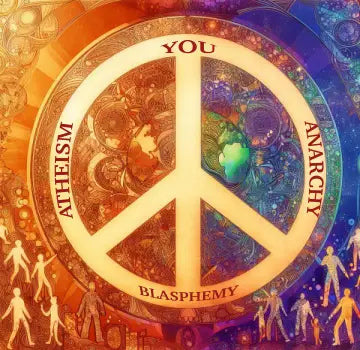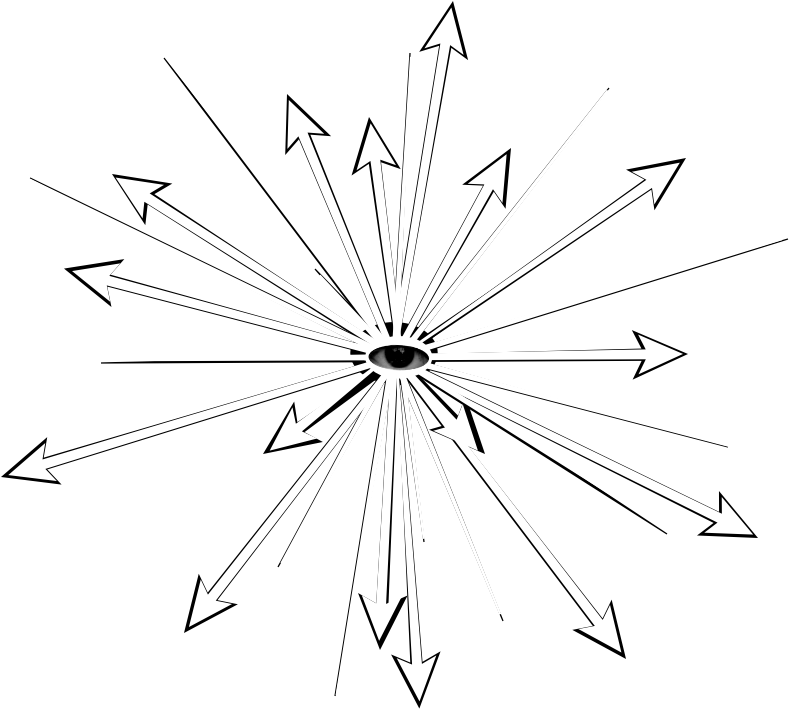As a practicing Antifascist (aka ANTIFA) readers should also know that I don’t believe in any of the Abrahamic religious god’s, the horrors of our present political and economic system, or feeling any obligation not to make fun of your religious beliefs if they are childish and stupid and full of magical thinking. Don’t expect to be treated like a rational adult when you’re acting like a fuckin’ retard.
For the fun of it lets clarify our terms:
Atheists are people who do not believe in the existence of any gods or supernatural beings, although this doesn’t rule out our respect for the mysteries of life. We decide right from wrong based on our own reasoning, experience, and values. We may also consult various sources of moral guidance, such as philosophy, science, humanism, or secular ethics. Atheists do not rely on divine commands or religious scriptures to determine morality. Because we aren’t children or brain damaged or otherwise developmentally delayed.
Some people may even think that we atheists are more moral than religious folks for several reasons. One possible reason is that atheists are more likely to base our morality on universal human rights and well-being, rather than on group loyalty or authority. Atheists may also be more open-minded and tolerant of different beliefs and lifestyles, as we do not judge others by their religious affiliation or conformity. Another possible reason is that we atheists are more accountable and responsible for our actions, as we do not attribute our moral successes or failures to divine intervention or forgiveness.
We atheists may also be more honest and consistent in our moral behavior, as we do not act out of fear of punishment or hope of reward in the afterlife. Atheists are more aware and concerned about the consequences of their actions, as they do not believe in a supernatural realm that can override or compensate for the natural laws and effects of reality. Atheists may also be more compassionate and empathetic towards others, as they recognize that this life is the only one we have, and that we share a common fate and destiny with all living beings.

As you can imagine, like the great poet Bob Dylan once said, “to live outside the law one must be honest.” Look at the shit Trump is in for refusing to grasp this simple ethical reality. Speaking of Trump, how can anyone believe that our system of governance is workable after our experience with him? Anarchy is much more functional.
I admire anarchy for its potential to create a society that is based on voluntary cooperation, self-governance, and individual freedom. Anarchy can be seen as a way to challenge the existing hierarchies, authorities, and institutions that may oppress, exploit, or alienate people. Anarchy can also be viewed as a creative force that encourages diversity, experimentation, and innovation in various aspects of life. Anarchy appeals to those who value autonomy, responsibility, and mutual aid over conformity, obedience, and competition.
Mikhail Bakunin was a Russian anarchist, revolutionary and philosopher who lived in the 19th century. He is considered one of the most influential figures of anarchism and one of the founders of the social anarchist tradition. He opposed both capitalism and state socialism and advocated for a federation of free and self-governing communes. He also criticized the authoritarianism and dogmatism of Karl Marx and clashed with him in the First International. He wrote many books, pamphlets and articles on various topics, such as authority, religion, class struggle, liberty and materialism. You can learn more about him from these sources: Wikipedia, Britannica, Wikipédia, Biografias y Vidas. Marx and the communists had better PR people and they had Vlad Lenin who was willing to kill people who got in his way (including the Czar and his whole fuckin’ family). The Marxists also had Stalin who was willing to kill Trotsky and Lenin. Bakunin missed his train otherwise you might have heard of him before.
If you’ve tried praying to Baby Jesus for help and heard back nothing but silence, well, it’s difficult not to kind of be pissed at him and his daddy-o. This may make you a blasphemer.
But one can argue that blasphemy is an act of freedom and open-mindedness and is to appeal to the value of free expression and the importance of challenging established norms and beliefs. Here is an example of how one might make such an argument: Blasphemy is often defined as the act of insulting or showing contempt for God or sacred things. However, this definition presupposes that there is a God or something sacred that deserves respect and reverence. This presupposition may not be shared by everyone, especially those who have different religious views or no religious views at all. Therefore, blasphemy can also be seen as a form of expression that reflects one’s own beliefs, opinions, or feelings about religion and spirituality.
You want to see how strong someone’s faith is? Throw ‘em into pain and loss and despair. The name Job from the bible is spelt the same as the noun job--not a fuckin’ coincidence. Look back at how far Sherrod Brown got in his POTUS run spouting “Jobs, jobs, jobs!” No motherfucker in the world wants a job. People must have jobs to have a roof over their heads and food on their tables. People don’t want to work, and you can prove this to yourself easily, just ask anybody, including yourself, whether you’d rather work or play? The highest paid people in our world are playing for their livelihoods—professional athletes, movie stars, pretend businessmen and their ilk. Work is doing shit you don’t want to do and play is the opposite. Freedom is NOT doing shit you don’t want to do and doing shit you want to do. Period. If I pray fervent;y for a healthy child and I get a profoundly retarded one, I’ll curse the god I never believed in anyway and tell him to eat shit and die—blasphemy. Fuck him if he can’t take a joke.
Blasphemy can be an act of freedom because it asserts one’s right to express oneself without fear of censorship, punishment, or coercion. Freedom of expression is a fundamental human right that is recognized and protected by international law. It allows people to communicate their ideas, thoughts, and emotions freely and openly, without being restricted by the authorities or the majority. Freedom of expression is essential for the development of democracy, human dignity, and social progress. the flaws, contradictions, or injustices in the dominant religious doctrines or institutions. It can also stimulate creativity, innovation, and diversity in the religious sphere. Blasphemy can encourage people to question their own assumptions and prejudices, and to explore alternative perspectives and possibilities. Blasphemy can foster a culture of tolerance, pluralism, and mutual respect among different faiths and beliefs.ble for both individuals and societies. Blasphemy can promote free expression and critical thinking, which are necessary for the advancement of human rights and human development.
Being an anarchist, atheist, and blasphemer can have many benefits, depending on your perspective.
- You can save money by not paying taxes, tithes, or fines.
- You can enjoy the freedom of not following any rules, laws, or commandments.
- You can express yourself creatively by making fun of authority figures, sacred symbols, and dogmas.
- You can challenge yourself intellectually by questioning everything, exploring alternatives, and seeking the truth.
- You can join a diverse and dynamic community of rebels, radicals, and revolutionaries.
- You can annoy your conservative relatives, friends, and neighbors with your unconventional views and actions.
Of course, being an anarchist, atheist, and blasphemer can also have some drawbacks, such as:
- You can face persecution, discrimination, or violence from the state, the church, or society.
- You can have difficulty finding a job, a partner, or a place to live that suits your preferences and principles.
- You can feel isolated, misunderstood, or rejected by mainstream culture and media.
- You can experience existential angst, moral dilemmas, or cognitive dissonance when dealing with complex and controversial issues.
- You can risk losing your sanity, your soul, or your life if you go too far in your defiance or dissent.
Ultimately, being an anarchist, atheist, and blasphemer is a personal choice that depends on your values, goals, and circumstances. It is not for everyone, but it can be rewarding for some. As Bakunin said: “The passion for destruction is a creative passion.”





